#byrd says things
Explore tagged Tumblr posts
Text

Biblically Accurate Fan
5K notes
·
View notes
Text



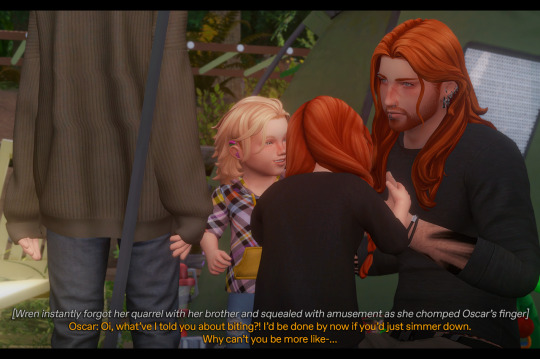
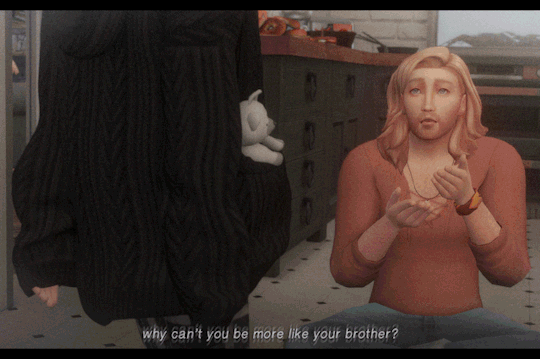

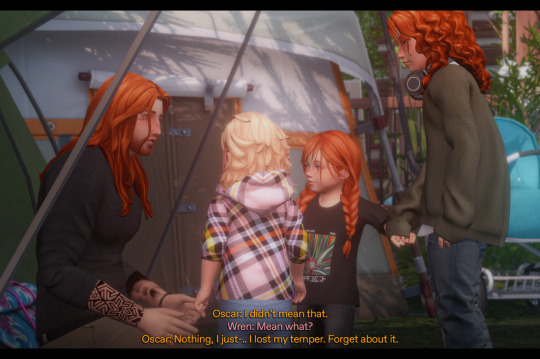
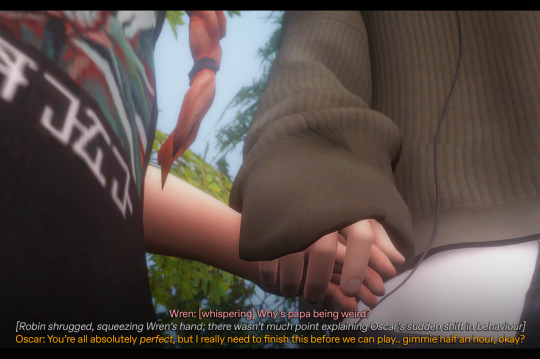
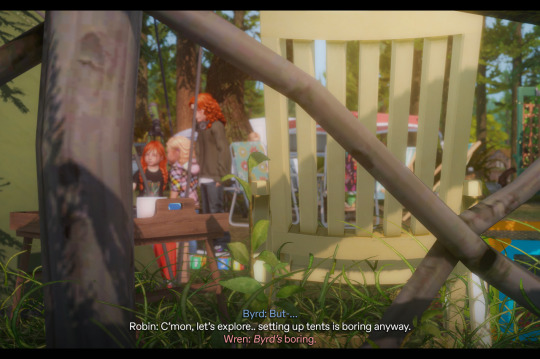
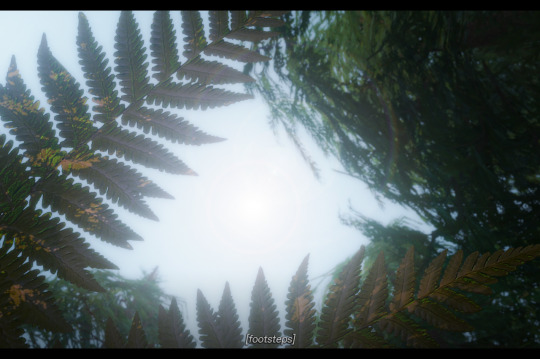
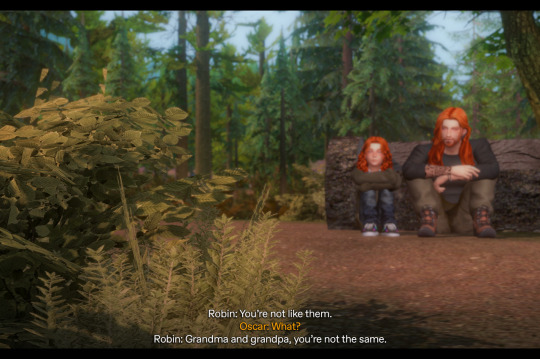

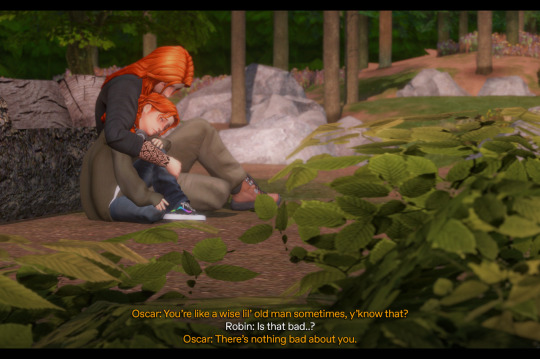
Previous // Next
[birds chirping] [incessant squabbling] Oscar: Guys-.. GUYS! Wren: He started it! [Byrd resisted Oscar’s attempts to wrestle him away from Wren, squirming out of his grasp like a victorious Houdini] [Wren instantly forgot her quarrel with her brother and squealed with amusement as she chomped Oscar’s finger] Oscar: Oi, what’ve I told you about biting?! I’d be done by now if you’d just simmer down. Why can’t you be more like-… [Oscar immediately swallowed his words, thrown into a decade’s old world full of doubt and resentment. Robin tugged Wren away from Byrd in a bid to diffuse the situation, watching his father with trepidation] Byrd: Like what?! Oscar: I didn’t mean that. Wren: Mean what? Oscar: Nothing, I just-.. I lost my temper. Forget about it. Wren: [whispering] Why’s papa being weird? [Robin shrugged, squeezing Wren’s hand; there wasn’t much point explaining Oscar’s sudden shift in behaviour] Oscar: You’re all absolutely perfect, but I really need to finish this before we can play.. gimmie half an hour, okay? Byrd: But-… Robin: C’mon, let’s explore.. setting up tents is boring anyway. Wren: Byrd’s boring. … [footsteps] Robin: You’re not like them. Oscar: What? Robin: Grandma and grandpa, you’re not the same. Oscar: Maybe it’s inevitable, ending up like our parents. Robin: Only bits n’ pieces, I reckon. [Oscar chuckled warmly, throwing his arm around Robin] Oscar: You’re like a wise lil’ old man sometimes, y’know that? Robin: Is that bad..? Oscar: There’s nothing bad about you.
#ts4#sims 4#simblr#ts4 story#sims story#forever in between#fib#oscar finch#robin finch#wren finch#byrd finch#ouuuuuuugh#poor oscar feels TERRIBLE abt almost saying the same thing his parents were forever saying to him#ahhhhhksdjsk#😩#gif warning
226 notes
·
View notes
Text
nobody:
my brain: imagine Tom Byrd/Lord John Grey but make it Kuroshitsuji AU where Tom is a little demon who takes care of everything for John and doesn't just dress him but disposes of his enemies
#let me just say#that it turns out I always had a thing for the master x servant ship#I also just love the idea of cute little Tom Byrd going feral#anyways I'm not going to write it or anything#but it's a cute idea#tom byrd#lord john grey
6 notes
·
View notes
Text

181 notes
·
View notes
Text
One of my uncles was a branch manager at a local bank when I was a kid. His branch had the dubious honor of being one of- if not the- most robbed bank in the area. There was a bullet hole in the wall behind his desk where he'd been shot at once.
One day, this guy came in and announced he was there to rob the place. This man was smoking a cigar with one hand and had a gun in the other.
My uncle pointed at the "No Smoking" sign and told him in no uncertain terms, "Put that cigar out, or finish it outside first."
This guy, bless his heart, went back outside to finish his cigar.
My uncle locked the door behind him and waited for the cops to show up.
Remember if you’re out at a store and someone says “This is a robbery” you can say “no it’s not” and then the robber will leave because theyre a robber and this is no longer a robbery .
#oh my fucking goddd#at the 7-11 story#hey look i have a story to contribute!#byrd says things#storytime with byrd
241K notes
·
View notes
Text
“The bulging eyes and the twisted mouth” - Violence, Violent Imagery & Black Horror

TRIGGER WARNING: mentions of death, violence, blood, hate crimes, antiblackness, police violence, rape
Note! I am going to be speaking from a Black American point of view, as my identity informs my experience. That said, antiblackness itself is international. The idea of my Blackness as a threat, as a source of fear and violence to repress and to destroy, is something every Black person in the world that has ever dealt with white supremacy has experienced.
There are two things, I think, that are important to note as we start this conversation.
One: there is a long history of violence towards Black bodies that is due to our dehumanization. People do not care for the killing of a mouse in the way they care about a human. But if you think the people you are dealing with are not people, but animals- more particularly, pests, something distasteful- then you will be able to rationalize treating them as such.
Two: even though we live in a time period where that overt belief of Blackness as inhuman is less likely, we must recognize that there are centuries of belief behind this concept; centuries of arguments and actions that cement in our minds that a certain amount of violence towards Blackness is normal. That subconscious belief you may hold is steeped in centuries of effort to convince you of it without even questioning it. And because of this very real re-enforcement of desensitization, naturally another place this will manifest itself is in how we tell and comprehend stories.
There are also three points I'm about to make first- not the only three that can ever be made, but the ones that stand out the most to me when we talk about violence with Black characters:
One: Your Black readers may experience that scene you wrote differently than you meant anyone to, just because our history may change our perspective on what’s happening.
Two: The idea that Black characters and people deserve the pain they are experiencing.
Three: The disbelief or dismissal of the pain of Black characters and people.
You Better Start Believing In Ghost Stories- You’re In One
I don’t need to tell Black viewers scary fairytales of sadists, body snatchers and noncoincidental disappearances, cannibals, monsters appearing in the night, and dystopian, unjust systems that bury people alive- real life suffices! We recognize the symbolism because we’ve seen real demons.
Some real examples of familiar, terrifying stories that feel like drama, but are real experiences:
12 Years a Slave: “This is no fiction, no exaggeration. If I have failed in anything, it has been in presenting to the reader too prominently the bright side of the picture. I doubt not hundreds have been as unfortunate as myself; that hundreds of free citizens have been kidnapped and sold into slavery, and are at this moment wearing out their lives on plantations in Texas and Louisiana.” – Solomon Northup
When They See Us: I can’t get myself to watch When They See Us, because I learned about the actual trial of the Central Park Five- now the Exonerated Five- in my undergrad program. Five teen Black and brown boys, subjected to racist and cruel policing and vilification in the media- from Donald Trump calling for their deaths in the newspaper, to being imprisoned under what the Clintons deemed a generation of “superpredators” during a “tough on crime” administration. And as audacious as it is to say, as Solomon Northup explained, they were fortunate. The average Black person funneled into the prison system doesn’t get the opportunity to make it back out redeemed or exonerated, because the system is designed to capture and keep them there regardless of their innocence or guilt. Their lives are irreparably changed; they are forever trapped.
Jasper, Texas: Learning about the vicious, gruesome murder of James Byrd Jr, was horrific- and that was just the movie. No matter how “community comes together” everyone tells that story, the reality is that there are people who will beat you, drag you chained down a gravel road for three miles as your body shreds away until you are decapitated, and leave your mangled body in front of a Black church to send a message… Because you’re Black and they hate you. To date I am scared when I’m walking and I see trucks passing me, and don’t let them have the American or the Confederate flag on them. Even Ahmaud Arbery, all he was doing was jogging in his hometown, and white men from out of town decided he should be murdered for that.
Do you want to know what all of these men and boys, from 1841 to 2020, had in common? What they did to warrant what happened to them? Being outside while Black. Some might call it “wrong place wrong time”, but the reality is that there is no “right place”. Sonya Massey, Breonna Taylor- murdered inside their home. Where else can you be, if the danger has every right to barge inside? There is no “safe”.
It is already Frightening to live while Black- not because being Black is inherently frightening, but because our society has made it horrific to do so. But that leads into my next point:
“They Shouldn’t Have Resisted”
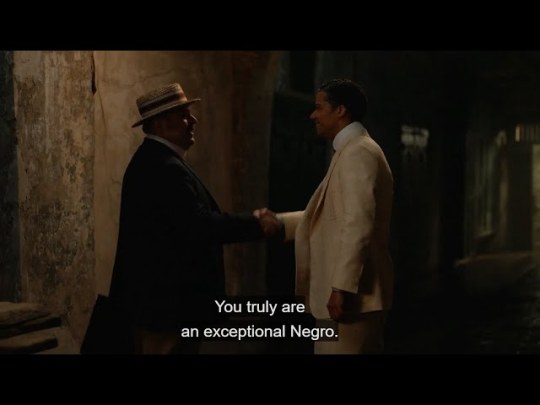
Think of all the videos of assaulted and murdered Black people from police violence. If you can stomach going into the comments- which I don’t, anymore- you’ll see this classic comment of hate in the thousands, twisting your stomach into knots:
“if they obeyed the officer, if they didn’t resist, this wouldn’t have happened”
Another way our punitive society normalizes itself is via the idea of respectability politics; the idea that “if you are Good, if you do what you are Supposed to do, you will not be hurt- I will not have to hurt you”. Therefore, if my people are always suffering violence, it must be because we are Bad. And in a society that is already less gracious to Black people, that is more likely to think we are less human, that we are innately bad and must earn the right to be exceptional… the use of excessive violence towards me must be the natural outcome. “If your people weren’t more likely to be criminals, there wouldn’t be the need to be suspicious of you”- that is the way our society has taught us to frame these interactions, placing the blame for our own victimization on us.
Sidebar: I would highly suggest reading The New Jim Crow, written in 2010 by Michelle Alexander, to see how this mentality helps tie into large scale criminalization and mass incarceration, and how the cycle is purposely perpetuated.
You have to constantly be aware of how you look, walk and talk- and even then, that won’t be enough to save you if the time comes. The turning point for me, personally, was the murder of Sandra Bland. If she could be educated, beautiful, a beacon of her community, be everything a “Good” Black person is supposed to be… and still be murdered via police violence, they can kill any of us. And that’s a very terrifying thought- that anything at any point can be the reason for your death, and it will be validated because someone thinks you shouldn’t have “been that way”. And that way has far less to do with what you did, than it does who you are. Being “that way” is Black.
My point is, if this belief is so normalized in real life about violence on Black bodies- that somehow, we must have done something to deserve this- what makes you think that this belief does not affect how you comprehend Black people suffering in stories?
Hippocratic Oath
Human experimentation? Vivisection? Organ stealing? Begging for medicine? Dramatically bleeding out? Not trusting just anyone to see that you are hurt, because they might take advantage? All very real fears. The idea that pain is normal for Black people is especially rampant in the healthcare field, where ideas like our melanin making our skin thick enough to feel less pain (no), an overblown fear of ‘drug misuse’, and believing we are overexaggerating our pain makes many Black people being unwilling to trust the healthcare system. And it comes down to this thought:
If you think that I feel less pain, you will allow me to suffer long before you believe that I am in pain.
I was psychologically spiraling I was in so much pain after my wisdom teeth removal, and my surgeon was more concerned about “addiction to the medication”. Only because Hot Chocolate’s mom is a nurse, did I get an effective medicine schedule. My mother ended up with jaw rot because her surgeon outright claimed that she didn’t believe that she was in more than the ‘healing’ pain after her wisdom teeth were removed. She also has a gigantic, macabre (and awesome fr) scar on her stomach from a c-section she received after four days of labor attempting to have me… all because she was too poor and too Black to afford better doctors who wouldn’t have dismissed her struggles to push.
As a major example of dismissed Black pain: let’s discuss the mortality rate of Black women during childbirth, as well as the likelihood of our children to die. When we say “they will let you bleed to death”, we mean it.
“Black women have the highest maternal mortality rate in the United States — 69.9 per 100,000 live births for 2021, almost three times the rate for white women, according to the Centers for Disease Control and Prevention. Black babies are more likely to die, and also far more likely to be born prematurely, setting the stage for health issues that could follow them through their lives.”
Even gynecology roots in dismissal (and taking brutal advantage of) Black women's pain:
“The history of this particular medical branch … it begins on a slave farm in Alabama,” Owens said. “The advancement of obstetrics and gynecology had such an intimate relationship with slavery, and was literally built on the wounds of Black women.” Reproductive surgeries that were experimental at the time, like cesarean sections, were commonly performed on enslaved Black women. Physicians like the once-heralded J. Marion Sims, an Alabama doctor many call the “father of gynecology,” performed torturous surgical experiments on enslaved Black women in the 1840s without anesthesia. And well after the abolition of slavery, hospitals performed unnecessary hysterectomies on Black women, and eugenics programs sterilized them.”
If you think Black characters are not in pain, or that they’re overexaggerating, you’re more likely to be okay with them suffering more in comparison to those whose pain you take more seriously- to those you believe.
What’s My Point?
My point is that whatever terrifying scene you think you’re writing, whatever violent whump scenario you think you’re about to put your Black characters through, there’s a chance it has probably happened and was treated as nonimportant (damn shame, right?) And when those terrifying scenes are both written and read, the way their suffering will be felt depends on how much you as a reader care, how much you believe they are suffering.
There’s a joke amongst readers of color that many dystopian tales are tales of “what happened if white people experienced things that the rest of us have already been put through?” Think concepts like alien invasion and mass eradication of the existing population- you may think of that as an action flick, meanwhile peoples globally have suffered colonization for centuries. The Handmaid’s Tale- forced birthing and raising of “someone else’s” children, always subject to sexual harassment by the Master while subject to hate from the Mistress- that’s just being a Mammy.
There’s nothing wrong with having Black characters be violent or deal with violence, especially in a story where every character is going through shit. That is not the problem! What I am trying to tell you, though, is to be aware that certain violent imagery is going to evoke familiarity in Black viewers. And if I as a Black viewer see my very real traumas treated as entertainment fodder- or worse, dismissed- by the narrative and other viewers, I will probably not want to consume that piece of media anymore. I will also question the intentions and the beliefs of the people who treat said traumas so callously. Now, if that’s not something you care about, that’s on you! But for people who do care, it is something we need to make sure we are catching before we do it.
“So I just can’t write anything?!”
Stop that. There are plenty of examples of stories containing horror and violence with Black characters. There’s an entire genre of us telling our own stories, using the same violence as symbolism. I’m not telling you “no” (least not always). I’m telling you to take some consideration when you write the things that you do. There’s nothing wrong about writing your Black characters being violent or experiencing violence. But there is a difference between making it narratively relevant, and thoughtlessly using them as a “spook”, a stereotypical scary Black person, or a punching bag, especially in a way that may invoke certain trauma.
The Black Guy Dies First
The joke is that we never survive these horror movies because we either wouldn’t be there to begin with, or because we would make better decisions and the narrative can’t have that. But the reality is just that a lot of writers find Black characters- Black people- expendable in comparison to their white counterparts, and it shows. More of a “here, damn” sort of character, not worth investment and easy to shrug off. The book itself I haven’t read, just because it’s pretty new, but I’m looking forward to doing so. But from the summaries, it goes into horror media history and how Black characters have fared in these stories, as well as how that connects to the society those characters were written in. I.e., a thorough version of this lesson.
Instead, I wrote an entire list of questions you could possibly ask yourself involving violence or villainy involving a Black character. Feel free to print it and put it on your wall where you write if you have to! I cannot stress enough that asking yourself questions like these are good both for your creation and just… being less antiblack in general when you consume media.
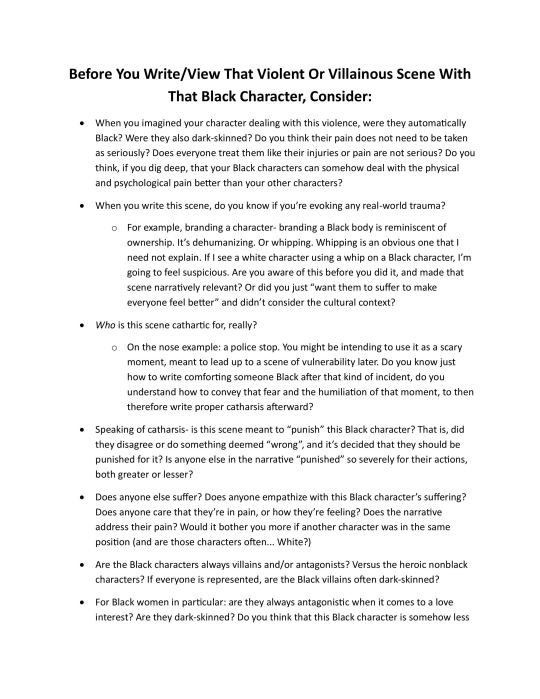
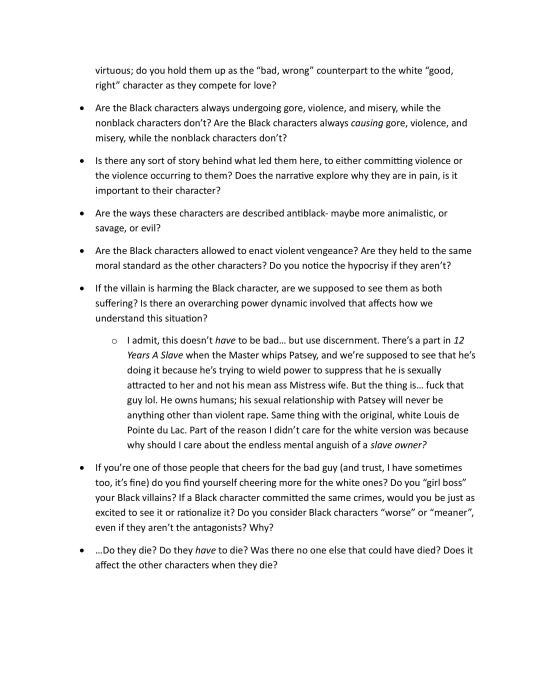
Black Horror/Black Thriller
We, too, have turned our violent experiences into stories. I continue to highly suggest watching our films and reading our stories to see how we convey our fear, our terror, our violence and our pain. There are plenty of stories that work- Get Out, The Angry Black Girl and her Monster, Candyman, Lovecraft Country (the show) and Nanny are some examples. There’s even a blog by the co-writer of The Black Guy Dies First who runs BlackHorrorMovies where he reviews horror movies from throughout the decades.
Desiree Evans has a great essay, We Need Black Horror More Than Ever, that gets into why this genre is so creative and effective, that I think says what I have to say better than I could.
“Even before Peele, Black horror had a rich literary lineage going back to the folklore of Africa and its Diaspora. Stories of haints, witches, curses, and magic of all kinds can be found in the folktales collected by author and anthropologist Zora Neale Hurston and in the folktales retold by acclaimed children’s book author Virginia Hamilton. One of my earliest childhood literary memories is being entranced by Hamilton’s The House of Dies Drear and Patricia McKissack’s children’s book classic The Dark-Thirty: Southern Tales of the Supernatural, both examples of the ways Black authors have tapped into Black history along with our rich ghostlore.” “Black horror can be clever and subversive, allowing Black writers to move against racist tropes, to reconfigure who stands at the center of a story, and to shift the focus from the dominant narrative to that which is hidden, submerged. To ask: what happens when the group that was Othered, gets to tell their side of the story?”

For on the nose simplicity, I’m going to use hood classic Tales From The Hood (1994) as an example of how violence can be integrated into Black horror tales. Tales From The Hood is like… The Twilight Zone by Black people. Messages discussing issues in our community, done through a mystical twist. Free on Tubi! If you want to stop here before some spoilers, it’s an hour and a half. A great time!
In the first story, a Black political activist is murdered by the cops. The scene is reflective of the real-world efforts to discredit and even murder activists speaking out against police violence, as well as the types of things done to criminalize Black citizens for capture. The song Strange Fruit plays in the background, to drive the point home that this is a lynching.
The second story deals with a Black little boy experiencing abuse in the home, drawing a green monster to show his teacher why he’s covered in wounds and is lashing out at school.
The fourth story is about a gangbanger who undergoes “behavioral modification” to be released from prison early. Think of the classic scene from A Clockwork Orange. He must watch as imagery of the Klan and of happy whites lynching Black bodies (real-life pictures and video, mind you!) play into his mind alongside gang violence.
Isn’t Violence Stereotypical or antiblack?

That last story from Tales From The Hood leads into a good point. It can be! But it does not have to be! Violence is a human experience. By suggesting we don’t experience it or commit it, you would be denying everything I’ve just spoken about. We don’t have to be racist to write our Black characters in violent situations. We also don’t have to comprehend those situations through a racist lens.
Even experiences that seem “stereotypical” do not have to be comprehended that way. I get a LOT of questions about if something is stereotypical, and my response is always that it depends on the writing!!! You could give me a harmless prompt and it becomes the most racist story ever once you leave my inbox. But you could give me a “stereotypical” prompt and it be genuine writing.
Let’s take the movie Juice for example. Juice in my honest to God opinion becomes a thriller about halfway in. On its surface, Juice looks like bad Black boys shooting and cursing and doing things they aren’t supposed to be doing! Incredibly stereotypical- violent young thugs. You might think, “you shouldn’t write something like this- you’re telling everyone this is what your community is like”. First- there’s that respectability politics again! Just because something is not a “respectable” story does not mean it doesn’t need to be told!
But if we’re actually paying attention, what we’re looking at is four young boys dealing with their environment in different ways. All four of them originally stick together to feel power amongst their brotherhood as they all act tough and discover their own identities. They are not perfect, but they are still kids. In this environment, to be tough, to be strong, you do the things that they are doing. You run from cops, you steal from stores, you mess with all the girls and talk shit and wave weapons. That’s what makes you “big”. That’s what gives you the “juice”- and the “juice” can make you untouchable.
I want to focus particularly on Bishop, yes, played by Tupac. Bishop, the antagonist of Juice, is particularly powerless, angry, and scared of the world around him. He puts on a big front of bravado, yelling, cursing, and talking big because he’s tired of being afraid, and he doesn’t know how to deal with it otherwise. So when he gets access to a gun- to power- he quickly spirals out of control. His response to his fear is to wave around a tool that makes him feel stronger, that stops the things that scare him from scaring him.
Now, that is not a unique tale! That is a tale that any race could write about, particularly young white men with gun violence! If you ever cared for Fairuza Balk’s character in The Craft, it is a similar fall from grace. But because it is on a young, Black man in the hood, audiences are less likely to empathize with Bishop. And granted, Bishop is unhinged! But many a white character has been, and is not shoved into a stereotype that white people cannot escape from!
Now would I be comfortable if a nonblack person attempted to write a narrative like Juice? Yes, because I’d worry about the tendency to lose the messaging and just fall into stereotype outright. But it can be done! The story can be told!
“But if Black violence bad, why rap?”
The short answer:
“In order for me to write poetry that isn’t political, I must listen to the birds, and in order to hear the birds, the warplanes must be silent.”
Marwhan Makhoul, Palestinian Poet
First, rap is not “only violence and misogyny”. Step your understanding of the genre up; there are plenty of options outside of the mainstream that don’t discuss those things. Second, every genre of music has mainstream popular songs about vice and sin. The idea that Black rappers have to be held to a higher standard is yet another example of how we are seen as inherently bad and must prove ourselves good. We could speak about nothing but drugs and alcohol and 1) there would still be white artists who do the very same and 2) we would still deserve to be treated like humans.
That said, many- not all- rappers rap about violence for the same reason Billy Joel wrote We Didn’t Start the Fire, the same reason Homer first spoke The Iliad- because they have something to say about it! They stand in a long tradition of people using poetry and rhythm to tell stories. Rap is an art of storytelling!
Rap is often used as an expression of frustration and righteous anger against a system built to keep us trapped within it. I’m not allowed to be angry? Why wouldn’t I be angry? Anger is a protective emotion, often when one feels helpless. Young Black people also began to reclaim and glorify the violence they lived in within their music, to take pride in their survival and in their success in a world that otherwise wanted them to fail. If I think the world fights against me no matter what I do, I’d rather live in pride than in shame with a bent head. Is it right? Maybe, maybe not. But if you don’t want them to rap about violence, why not alleviate the things leading to the violence in their environment?
Whether you choose to listen to their words, because the delivery scares you- and trust, angry Black men scared the music industry and society- doesn’t make the story any less valid!
Conclusion
I am going to drop a classic by Slick Rick called Children’s Story. I think listening to it- and I mean genuinely listening- summarizes what I’ve said here about how Black creators can tell stories, even violent ones, and how even the delivery through Blackness can change how you perceive them. Please take the time to listen before continuing.
youtube
I’ve been alive for 28 years and have known this song my whole life, and it just hit me tonight: not once is the kid in this story identified as Black! My perception of this story was completely altered by my own experiences, who told the story, and how it was told.
That’s what I’m trying to tell you. You can tell stories of violence that involve Black characters. I love and adore a good hurt/comfort myself! But you need to be cognizant of your audience and how they’ll perceive the story you’re telling, and that includes the types of imagery you include. It’s not effective catharsis via hurt/comfort for the audience if your Black readers are being completely left out of the comfort. “I wrote this for myself” that’s cool, but… if you wrote racism for yourself, and you’re willing to admit that to yourself, that’s on you. I’d like to think that’s not your intention! You can write these stories of woe and pain without mistreating your Black characters- but that requires knowing and acknowledging when and how you’re doing that!
@afropiscesism makes a solid point in this post: our horror stories are not just fairytales full of amorphous boogiemen meant to teach lessons. Racial violence is very real, very alive, and we cannot act like the things we write can be dismissed outright as “oh well it’s not real”. Sure, those characters aren’t real. But the way you feel about Black bodies and violence is, and often it can slip into your writing as a pattern without you even realizing it. Be willing to get uncomfortable and check yourself on this as you write, as well as noticing it in other works!
If you’re constantly thinking “I would never do this”, you’ll never stop yourself when you inevitably do! If you know what violent imagery can be evoked, you can utilize it or avoid it altogether- but only if you’re willing to get honest about it. You might not intend to do any of this, but it doesn’t matter if you don’t change the pattern, because as always, it’s the thought that counts, but the action that delivers!
#creatingblackcharacters#long post#writing#writing black characters#black character design#black history#media history
1K notes
·
View notes
Text










As bisexual visibility month approaches us, I wanted to highlight a few bi books we don't see people talking about much and give people some recs for bi books to read!
Books listed:
Fall Into You by Georgina Kiersten
Splinter by Jasper Hyde
Spring on the Peninsula by Ery Shin
When Tara Met Farah by Tara Pammi
Forever Is Now by Mariama J. Lockington
More to Love by Georgina Kiersten
When the Stars Alight by Camilla Andrew
Lulu Sinagtala and the City of Noble Warriors by Gail D. Villanueva
No Two Ways by Chi Yu
Exposing Lesser Demons by K.N. Robertson
Wolfpack by Rem Wigmore
A Dance of Water and Air by Antonia Aquilante
Hugged by Verity Ritchie
Where Willows Weep by Luna Fiore
Fake it by Lily Seabrooke
Small Gods of Calamity by Sam Kyung Yoo
Beyond Repair by Catherine Stein
Baptism of Fire by Jessie Thomas
Poisoned Primrose by Dahlia Donovan
Birthright by M.A. Vice
A Masc for Purim by Roz Alexander
Your Driver is Waiting by Priya Guns
Errant by L.K. Fleet
Loser of the Year by Carrie Byrd
Fortune Favors the Dead by Stephen Spotswood
Monstersona by Chloe Spencer
Scoring a Spouse by Liz Lincoln
Tengoku by Rae D. Magdon
Leaving's Not the Only Way to Go by Kay Acker
Speech and Debacles by Heather DiAngelis
Things I'll Never Say by Cassandra Newbould
Chameleon Moon by RoAnna Sylver
Allure by CEON
To Beg or Not to Beg by Cat Giraldo
Shadows Dark and Deadly by Andrea Marie Johnson
Ride with Me by Jenna Jarvis
Dearly Departed by Heather Novak
Swift and Sudden Exit by Nico Vincenty
Wishing on Winter by Brenna Bailey
Crystrals and Contracts by A. A. Fairview
Tomb of Heart and Shadow by Cara N. Delaney
False Hearts and Broken Frets by Elle Bennett
The Blood Born Dragon by J. C. Rycroft
An Act of Devotion by A. M. Leibowitz
Biting down by Torrance Sené
#My posts#bisexual#bisexual representation#bisexual pride#bi books#bisexual books#sapphic books#booklr#book blog#queer books#lgbt books#lgbtq books#bisexual romance#bookblr#book tumblr#Bi rep#achillean books#bi4bi books#bi4bi#Bi4bi rep#queer bipoc books#bi pride#bisexuality#bisexual rep#bisexual butch#butch books#butch bi
691 notes
·
View notes
Text
Quick long story based on my last reblog:
I used to work in the compliance department for public access television in Manhattan in the 90s. If you're not familiar with public access, it was basically YouTube and TikTok before the web existed -- local tv channels that anyone could broadcast on. and it was everything -- dance shows, kids shows, educational programs, queer programming, labor rights shows, wannabe stars, porn stars, amateur wrestlers, bus and train spotters, therapy help lines, psychics, spoken word shows, punk rock shows, and a ton of experimental tv.
A lot of famous people got their start on public access way back when and especially on MNN. They weren't called 'Creators' or 'Influencers' back then -- they were 'Producers'.
My job was to make sure that all of the shows were in FCC and local station compliance -- nothing lewd or graphic out of the safe harbor hours, no "Seven Dirty Words", etc. Every morning, I'd come into office, read through the complaints sent in via mail (actual letters) or left as voice messages overnight on the hotline. Once someone complained, I'd have to go down to the tape library, pull the (video) tape in question, watch it, and fill out a form to say whether it was a real violation or not.
Sometimes it was. The edgelords of the 90s were guys who'd submit shows about something mundane and then slip a few minutes of scat, mutilation porn, gore, or maybe a beheading or war footage into a mundane show about birdwatching or whatever. (By the time shock sites like rotten dot com came online, I was fully inoculated.) Those were easy calls.
Most of the time the producers were chill about it. Robin Byrd -- pornstar, and host of a call in show about all things sex was always super sweet about it. So were the producers who filmed the local drag balls when I had to tell them that they forgot to edit out a random peen popping out of a thong.
My favorite complaints were for a show I think was called 'Mustafa' (but I can't be sure). It was just a young guy with dreads and dark sunglasses, sitting motionless in his apartment window for 30 minutes, in a single shot. That was it. That was the show.
It drove one viewer into a state of rage.
He'd call the complaint line screaming: "I want to file a complaint about this show! Why is this shit on my television -- he's just sitting there doing nothing!!! This is a waste of money!!! I'm not paying for this!!!"
And then a second message: "I just watched this entire show until the end and HE NEVER MOVED!!!"
This man called nearly every week for half a year. It was beautiful.
149 notes
·
View notes
Text
@groovy-rat-man I know exactly how you feel

Do you guys wanna see a cursed food item I found at the glorious American discount supermarket store
740 notes
·
View notes
Text



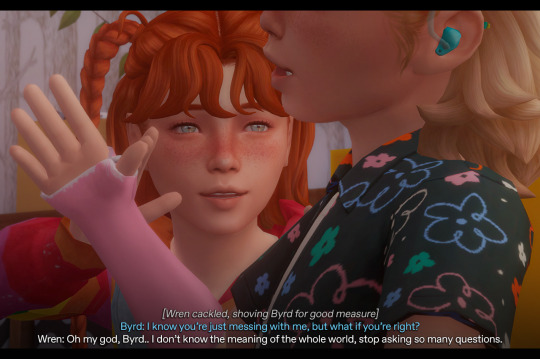
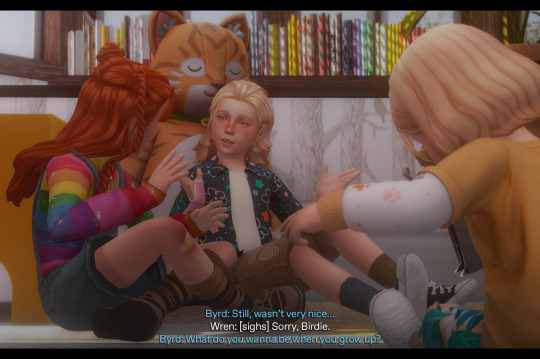




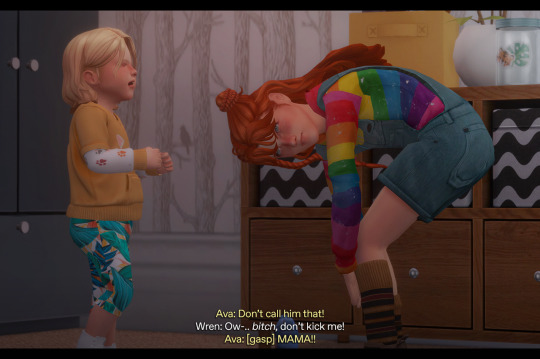

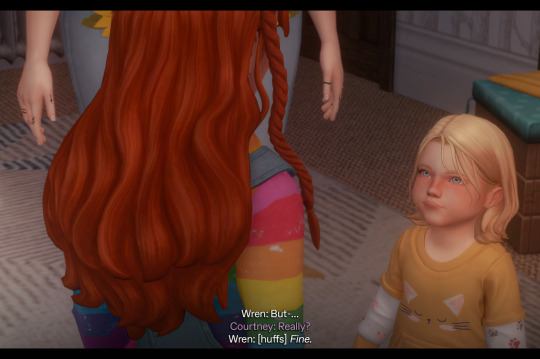
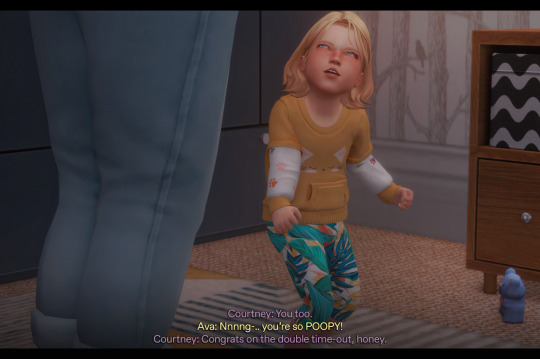
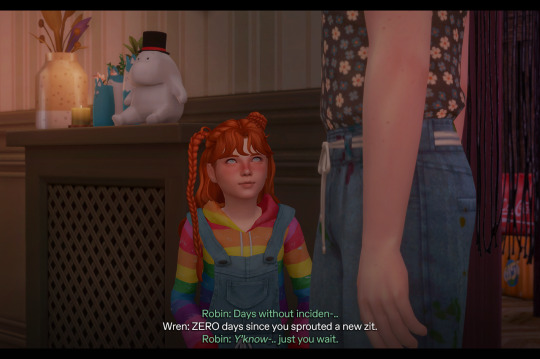
Previous // Next
Byrd: Don’t you think mom n’ dad have been a bit weird recently? Wren: It’s probably just ‘cause grandma’s sick. Byrd: Do you think she’ll die? Wren: She said she’ll be fine. Byrd: I think she’s just saying that, don’t you? Wren: [scoffs] How am I supposed to know?! Byrd: If I were a doctor, I could fix her. Wren: You’re too stupid to be a doctor. Byrd: Hey! [Wren cackled, shoving Byrd for good measure] Byrd: I know you’re just messing with me, but what if you’re right? Wren: Oh my god, Byrd.. I don’t know the meaning of the whole world, stop asking so many questions. Byrd: Still, wasn’t very nice… Wren: [sighs] Sorry, Birdie. Byrd: What do you wanna be when you grow up? Wren: I don’t know, who cares. Byrd: Ugh, you’re no fun-.. what about you? Ava: Ummmm, I wanna be a boss. Byrd: [laughs] The boss of what? Ava: Dunno-.. stuff? Or a tree. Wren: You wanna be the boss of a tree? Ava: No, I wanna be the tree. Wren: You can’t be a tree, thick-o. Byrd: Don’t listen to her, you can be anything you want! Wren: She can’t. Byrd: Well, that’s what mom always says. Wren: Yeah, but not literally-.. bird brain. Ava: Don’t call him that! Wren: Ow-.. bitch, don’t kick me! Ava: [gasp] MAMA!! Wren: Ava kicked me again! Ava: Wren said a naughty word-.. and called Byrd a bird brain. Courtney: Well.. neither of those things are nice, are they? You know what to do. Wren: But-… Courtney: Really? Wren: [huffs] Fine. Courtney: You too. Ava: Nnnng-.. you’re so POOPY! Courtney: Congrats on the double time-out, honey. Robin: Days without inciden-.. Wren: ZERO days since you sprouted a new zit. Robin: Y’know-.. just you wait.
#ts4#sims 4#simblr#ts4 story#sims story#forever in between#fib#courtney finch#robin finch#wren finch#byrd finch#ava finch#ten million years later.. the penny drops for byrd like hmmm smth is up#😂#and ofc what started as an earnest conversation just devolves into chaos and time-outs#wren is pretty much on the time-out stool every day for some reason or other lmao#ksjdksj
164 notes
·
View notes
Photo
Not gonna lie, I thought this was a Minion at first


Hey, Picasso, I like it
15 notes
·
View notes
Text
(Dominic Byrd-McDevitt on LinkedIn)
On Friday night, the president officially fired the Archivist of the United States, as he had promised to do before taking office. So, hi there! 👋 Former National Archives employee here. The quality of the reporting on this has been disappointing to say the least, with only the most basic understanding of what the National Archives does. This is bigger than a little spat with a small agency.
Yes, the National Archives holds billions of pages of government records—essential for research, journalism, and government transparency—making it a crucial part of how citizens hold their government accountable, and also a key steward of our nation’s historical narratives. But, even beyond that, the functions of the National Archives and the Archivist of the United States are far more significant than most citizens realize. If you are wondering about what this could mean for our democracy, here is a short list of other things you should know about NARA and the AOTUS:
The Archivist of the United States is responsible for administering the Electoral College process. They are provide the official instruction to the states on how to carry out their Electoral College voting and transmit their electors’ votes, and also for receiving and validating the certificates before public viewing and permanent preservation.[1]
The National Archives is responsible for the publication of the Code of Federal Regulations, which is the official document that codifies all regulations of federal agencies, as well as the Federal Register, which is where the government gives notice of presidential actions, public meetings, and any proposed changes federal regulations before their required public comment period.
The National Archives is responsible for administering the Constitutional amendment process. The Archivist would receive any proposed amendment from Congress and transmit it to the states with instructions. They then receive and authenticate any ratification documents from the states. When sufficient states ratify, the Archivist is the one that formally certifies that the Constitution has been amended, with an official proclamation.[2]
As the National Archives states in all of its rulemaking postings, “Agencies may not destroy Federal records without the approval of the Archivist of the United States.” The National archives maintains records schedules, mandatory rules for agencies about how to retain records, and can determine which records are temporary (not permanently preserved). When these are violated, NARA can investigate and conduct oversight.[3]
The National Archives houses the National Personnel Records Center for the federal government. This is where all the personnel files of all federal employees are transferred after they separate from the government. Agencies have been charged with making lists of employees engaged in certain jobs for the White House, but it is worth noting any federal worker who ever left the government before now also has a file at the NPRC.
The National Archives has important roles in the classification process, including housing the Information Security Oversight Office and the National Declassification Center. In addition, the National Archives receives classified documents from the government for retention, as was widely reported during the president’s related criminal indictment. ISOO is the office that, by law, must be notified by anyone who encounters mishandled classified documents.[4]
The Freedom of Information Act (FOIA) ensures that citizens have the ability to hold the government accountable by establishing a right to access public records. It is a crucial tool for journalists. National Archives’ Office of Government Information Services is the ombudsman for federal FOIA program, receiving public complaints about violations of the law and producing compliance reports on agencies.[5]
Do you know of anyone who wants to interfere with the Electoral College vote, wipe out government regulations, change the Constitution, destroy or illegally retain government records, etc.?
So far, with everything else going on, this has hardly registered in the top news stories. It is important to know that none of this is normal. No Archivist of the United States has ever been fired by a president, in almost 100 years since the position was created, making Shogan—the first woman in the office—the shortest serving AOTUS. This is an apolitical position, even when the officeholder was appointed by the previous president. The statute regarding the office of the Archivist of the United States (44 USC § 2103) reads: "The Archivist shall be appointed without regard to political affiliations and solely on the basis of the professional qualifications required to perform the duties and responsibilities of the office of Archivist."[6]
Regardless of your politics, failing to defend the independence National Archives and its staff right now—and allowing it to be gutted or turn political—could be disastrous for the future of democracy.
Notes
[1] Here is the letter sent by Shogan after before 2024 election to state officials: https://www.archives.gov/files/electoral-college/state-officials/example-archivist-letter.pdf
[2] Here is the Archivist’s proclamation of the 27th Amendment: https://catalog.archives.gov/id/1512313
[3] For example, here is the letter sent when, in the Obama administration, the IRS was scrutinized for targeting conservatives and emails were deleted. https://oversight.house.gov/wp-content/uploads/2014/06/6-17-2014-NARA-to-Bennett.pdf The Archivist provided testimony to Congress in the matter. https://www.politico.com/story/2014/06/irs-lost-emails-archivist-108242
[4] In response to high-profile cases of government officials retaining classified documents, ISOO published a notice in 2023 with guidance on identifying and handling classified materials. https://www.archives.gov/files/isoo/notices/cogc-isoo-notice-final-06-21-2023.pdf
[5] See https://www.archives.gov/ogis/mediation-program/request-assistance & https://www.archives.gov/ogis/foia-compliance-program
[6] It also states regarding removal from office: "The President shall communicate the reasons for any such removal to each House of the Congress." Which does not appear to have happened yet, or has not yet been reported in any news reports. 44 USC 2103
68 notes
·
View notes
Text
I came across a copy of a French music magazine, “Rock & Folk” with TLSP on the cover. Here’s the scans and interview (via Google Translate). Enjoy! ☺️







THE LAST SHADOW PUPPETS
THE POP LIGHT CAN COME FROM TWO SCRUBBY BRITISH KIDS. AN ARCTIC MONKEY, ALEX TURNER AND HIS BUDDY, MILES KANE UNVEIL THIS INCREDIBLE PROJECT. BY PHILIPPE MANOEUVRE, PHOTOS BY CHLOE DES LYSSES.
A pop, pop, pop world? Why not? But here we return again and again, to the same abracadabra concept of the pop masterpiece. Everyone knows pop masterpieces, everyone has their own favourite. Tell me your pop masterpiece and I'll tell you who you are. Because since the beginnings of the Beatles - and even Elvis had already indicated the direction with "Heartbreak Hotel" - modern pop has never stopped going back and forth between raw discharges of ultra-violent electricity and research into atmospheres, and especially melodies.
For the May 68 special edition, we meet Philippe Paringaux, retired from Paris but not from rock. Working from his Brittany home on numerous musical translations, personal writings, and other works, Paringaux never stops listening and re-listening to rock, like the rest of us. His vision is clear: "From 1962 to 1972," he explains, "we experienced the age of melody. Then it dried up, and since then, we've experienced something else." The era of the riff? The great shaker world? Something else.
Extraordinarily, the examples of the great masters remain. We could have filled a column with them, with sleeves and notes to back them up. But a simple statement of the facts will suffice for the reader: "Pet Sounds", “Rubber Soul”, “…Melody Nelson”, the White Album and "Abbey Road”, “Ziggy Stardust”, Roxy Music, Marc Bolan, Scott Walker, Todd Rundgren, Big Star Dwight, Twilley Band, Robert Wyatt's "Rock Bottom," Love, Gene Clark, The Byrds, and CSN&Y. Not to mention Phil Spector's Wall of Sound. There it is, very hastily summarized, the pop of rock 'n' roll. Sometimes it's good to sort and organize your ideas. Especially when you're writing about the Arctic Monkeys.
A band that appears in these columns on the express recommendation of Hedi Slimane. When the first album comes out, it's immediately madness in Great Britain: on the day of the record's release, 300,000 buyers. And it should be noted, there's no local smear campaign, no old fogey explaining that it was better before, that they should have rehearsed more. No, the very British Monkeys fever attracts colossal worldwide attention, the forums go wild, and the Arctic Monkeys become the darlings of festivals overnight, offering their frenetic, tense, and hard-hitting rock to totally captivated crowds. It's beautiful, a rock 'n' roll country.
London, very special correspondent
Precisely, on this Monday in February, Great Britain is warming up under a timid spring sunshine. From St Pancras, we take a cab to a faux-designer, truly posh hotel. We're munching on a lukewarm burger when our guests for the day, Miles Kane and Alex Turner, arrive. With their shrew-like looks and bowl cuts, they look like two runaway schoolboys who've come to flirt in the hotel bar. In fact, our two pop stars have left their respective bands to record a kind of improbable kind of UFO, a twelve-track album that's like a collision of an entire, ultra-enjoyable catalog of pop effects plucked from a fertile past. Are there any songs, or have our two buddies simply piled on the effects to feign the real thing? Impossible to say before a hundred listens. But judging by the reception on radio and some TV stations, there's a risk of a small tsunami surrounding this record, something nothing in the Arctic Monkeys' two albums could have predicted.
Putting down their sodas, Alex in a pea coat and Miles in a jacket introduce themselves and follow the press officer into a simple conference room. The decor is reminiscent of a police office. A table, three chairs, and a pencil lying there. Everyone opts for coffees at the generous suggestion of the hostess. Here we go...
Rock&Folk: OK, here we go... And the questions are plentiful... Where did this record come from? How did the idea come about? Who's behind it? Your respective bands, what do they think of it?
Miles Kane: That's a lot of questions!
Alex Turner: There's a lot of people at the door!
Miles Kane: Please choose your questions (general laughter).
R&F: OK... it's your turn!
Miles Kane: Once upon a time...
Alex Turner: Ah, you're starting from there?
Miles Kane: From the beginning of our romance, yes.
Alex Turner: Years ago... Miles was playing in his band, the Rascals, and I was playing in my band, the Arctic Monkeys. We did our first tour together. And then something happened, we became friends. Miles and his band toured with us again, a friendship was born, and we said to ourselves... Anyway, we made this project that...
Miles Kane: One day...
Alex Turner: So, one day, we would make an album together.
R&F: So what's the name of the band?
Miles Kane: This is the first interview we're giving. It's pretty important for us to tell you, because we haven't told any journalists yet, you'll be the first to know, it's going to be called...
Alex Turner: It's called The Last Shadow Puppets.
R&F: Wow!
Alex Turner: I like first times.
R&F: Are you the same age?
Alex Turner and Miles Kane: Yeah, yeah, sure, okay, the same, that's it, yeah.
Alex Turner: Miles is from Liverpool. I lived two hours away...
Miles Kane: After two years, our friendship has become amazing. Hasn’t it, Alex?
Alex Turner: Totally!
Miles Kane: And we made the record, but not just any record, because we decided to create—very dramatically on our part!—an epic masterpiece-
R&F: Totally pop nonetheless...
Alex Turner: Yes, pop, so what?
R&F: Listening to this record might be quite a shock for the Arctic Monkeys fan...
Alex Turner: Very true.
Miles Kane: Sorry, we listened to the album "Scott Walker Sings Jacques Brel" and I wouldn't say it changed our lives, no, but it had a huge impact on us.
Alex Turner: Exactly.
Miles Kane: Scott Walker and Bowie, always Bowie of course.
Humor, dignity, and madeleines
R&F: To continue very quickly, we noted influences on this record from Lee Hazlewood, Phil Spector, Ennio Morricone, Love, The Byrds, Burt Bacharach, Scott Walker, Suede, Gainsbourg...
Miles Kane: Don't forget the Beatles and especially David Axelrod, for the strings. For example, "My Mistakes Were Made For You" is a tribute. We even found Axelrod's drum sound, identical strings, everything.
R&F: For our photographer, "it sounds like film music"...
Alex Turner: That’s it. We wanted to make a cinematic album.
R&F: Miles, your favourite film?
Miles Kane: The "Pink Panther" series. (chuckles).
R&F: From the first song, the rhythm races, it's like a spaghetti western...
Alex Turner: Absolutely. We wanted to make this record, I wanted to get these songs out of my head, OK? We met a guy named James Ford who had worked with the Monkeys and Miles too. We set aside two weeks in the summer and, immediately after the Benicassim festival, in the middle of August, Miles, James, and I left for the Black Box studio not far from Angers, in the smiling French countryside.
Miles Kane: Two weeks in France! We had never drunk so much red wine, devoured so many cakes. Do you know madeleine?
R&F: Madeleines? What do you mean, madeleines (follows a long rant about Proust and the Search for Lost Time)?
Alex Turner: Well, I'm addicted to madeleines.
R&F: Listening to the record, we wondered what strange drug had presided over the creation of this album?
Alex Turner: Madeleines.
Miles Kane: Come on, Phil, it's the new trendy high, admit it!
R&F: We find it hard to believe that mushrooms didn't play a role in your lush creation...
Alex Turner (laughs): No, no mushrooms entered the composition of this record, no... On the other hand, the idyllic atmosphere of sunsets, dawns over the countryside, all that, yes...
Miles Kane: Stop it, we didn't leave the studio for two weeks!
Which mentor?
R&F: Tell us about James Ford. Is he the mentor behind the whole project?
Miles Kane: Mentor? Alex and I write the songs, after all.
Alex Turner: James plays the drums, he does all the drums. He plays a lot of bass, keyboards, but in a way this record was made by three of us, the two of us and him. James plays the drums not too loudly while all modern drummers pound heavily like furious people. He digs the rhythm, discreet and chic, it's important...
R&F: At the same time, pop project or not, the sound remains rough, not polished. In short, an overall indie rock sound...
Alex Turner: Totally. Because if we set out to make a pop masterpiece with strings, which was totally our intention from the start, there's the risk of being corny.
R&F: Not corny, ever...
Miles Kane: There you go! Not corny or vulgar.
Alex Turner: Enter Owen Paley, formerly of Arcade Fire, who was fed up with concerts and came back to settle in Canada. This guy is our age, he hasn't done much before, so he wanted to express himself through us, but above all, he knows where not to go with the strings.
What pop music lacks
R&F: Another obvious question would be: Are you going to tour with this project?
Alex Turner: ...and the good answer would be: Why not, we hope...
R&F: There you go...
Alex Turner: There you go.
R&F: What this record says is: Apart from the brutal success of the Arctic Monkeys, we need pop, we need melodies to hold on to, right?
Alex Turner: Some fans will follow, that's clear...
Miles Kane: In pop, we have nothing! This stuff that's on TV is hot air.
R&F: Well, well, explain that to us. What is pop missing at the moment?
Miles Kane: It lacks class. The production is unreal, soulless.
Alex Turner: It lacks singable harmonies, it lacks melodies. It lacks everything, if you look at it closely.
Miles Kane: There's no sophistication anymore. At the same time, mind you, we didn't come to save the world either (laughs). We simply wanted to make a magnificent record, a pop record... And we didn't want to wait until we were fifty to buy violins.
Alex Turner: Nobody does that anymore. The rockers in English bands, if you talk to them about orchestration, it's immediately offensive.
R&F: What could you add?
Alex Turner: Nothing, just details. We can reveal that the first song on the record, the one that gives the album its title, was written last... Are you interested?
R&F: Are there any studio outtakes? Any unreleased tracks?
Alex Turner: Oh yeah, for the future box set in twenty years (laughs).
Miles Kane: Starting in January, we recorded some unreleased material for the B-sides. During the Christmas period, a new title stood out, "Separate And Ever Deadly." We added it to the album, keeping the number of tracks to twelve.
Alex Turner: We recorded in August, then we both went back on tour with our bands for two months. At Christmas, we listened back, recorded the B-sides, and Owen arrived in London for the strings. After three days, the mixing began, and that's it.
R&F: Were you surprised by the impact these strings had?
Alex Turner: Owen brought the record to life. It was amazing, suddenly our little demos, our sketches, were coming to life. We'd only been writing these songs since 2006, but we had no idea they would come out like this. The arrival of the strings boosted everything.
Clean, clean, clean
R&F: And the internet?
Alex Turner: What, the internet?
Miles Kane: I've never downloaded a single song in my life. Downloading is something I've never done. I collect my records, I'm a vinyl person without snobbery, CDs out of obligation, that's it...
R&F: The internet has certainly accelerated people's knowledge of music. On forums, everyone is always one click away from discovering loads of masterpieces. But what are your favorite Beatles albums?
Alex Turner: "Rubber Soul."
Miles Kane: "Revolver." The harmonies...
R&F: Serge Gainsbourg?
Alex Turner: That's James. He's a huge fan of "...Melody Nelson." I really like watching Gainsbourg's TV appearances. Every time he invents something, he does something amazing or hilarious. What a character!
R&F: How do you both compose? On guitar or piano?
Alex Turner: On guitar. Acoustic, eye to eye.
Miles Kane: We walk like caged lions, we twirl, we strum, we write, we throw the book of lyrics at each other. We start from nothing, we build these little songs and I write, I submit stuff to him, and he's like, "Yeah, that's it!" And if he rips his shirt off with joy at the end, it's good.
R&F: How do you divide up the vocals?
Alex Turner: Hell of a lot. Sometimes it's him, sometimes it's me, sometimes we harmonize.
Miles Kane: Alex loves to harmonize, and when we started singing together, it was a miracle. Our voices blended beautifully. As with songwriting, it's really a twin project.
R&F: Alex Turner, unlike your colleagues Amy Winehouse and Pete Doherty, you're never in the tabloids...
Alex Turner: That's just the way it is, I rarely go out. Most of the time, in fact, I stay at home composing. I'd describe myself as quite a boring guy, you know, I stay in my basement slaving away at my melodies. Not enough to stop the presses.
R&F: Explain your title, "The Age of Understatement"...
Alex Turner: Well, precisely because this album was created in a period when no one was trying anything anymore. Why not? That's a good reason.
R&F: How could we define good pop?
Alex Turner: If we knew, we'd make it. Pop can't be too subtle...
Miles Kane: That said, you shouldn't force anything either. It's somewhere in between.
R&F: Scott Walker is your absolute master, and yet he doesn't sell many records...
Alex Turner: That's the point. I know a lot of people won't like this record or understand it. Releasing this project on the market now is madness, almost utopian. I don't care about the result because we'll move on very quickly.
And the end
R&F: The rest?
Miles Kane: We're going to make videos, the first one is being filmed in Russia, the second for the upcoming single, and there will eventually be concerts...
Alex Turner: We might play the Olympia in Paris. This album calls for a beautiful venue like that. If people like the record, we'd like to play it in very beautiful venues. That would be fabulous. That's our dream at the moment.
R&F: You're not worried either...
Alex Turner: Very excited. That's what we wanted to achieve, and we did it. What could be better?
R&F: Do you recommend listening with headphones?
Miles Kane: ...And with dark glasses.
Not superstitious
An incredibly dynamic photo shoot follows, on the fly, in the hotel corridors, the meeting room, and then out in the street. Everything goes well, very quickly. The press officer rushes to phone this excellent news to her office. The photographer really directs the two rockers, who decide that "since she knows what she wants, we'll cooperate." Alex Turner barely refuses to pose in front of a green mural ("I'm not superstitious, but..."). Suddenly, the two boys look to the side, deaf to the photographer's calls, fascinated, hypnotized. A young Dutch woman, a top model, passes by in the street. An impromptu session ensues between the two pop stars and the Dutch beauty. We return to the hotel. Still under the spell of the divine and unexpected encounter, Alex Turner remains dreamy. Our hearts beat a little faster. What if this was pop, for real? ★

#not miles calling them a romance 🥰#baby puppets#taotu era#rock and folk magazine#may 2008#miles kane#alex turner#tlsp
38 notes
·
View notes
Text
Beatles defending each other ❤️
In 1965 [the Byrds] toured England and Paul invited us to his club, the Scotch of St James’s [sic]. He sent a limo to pick us up. He said he had been listening to our music. We were blown away. He took us for a ride through London in his Aston Martin, at great speed. He was really hip, he and John were so tight it was like one person at times. Unlike the Byrds, [where] Crosby would just leave you out to dry, the Beatles all defended each other to the hilt. If you criticised, say, George then they would all respond.
Roger McGuinn, in Paul McCartney: Now & Then, Tony Barrow and Robin Bextor
“They’re four very different people who together form a unit that is virtually impregnable. If, for instance, someone should find fault with anything one of them has done, the others rush to his defence. They close their ranks. They’re very close indeed. A lot closer than people think.”
George Martin, Disc and Music Echo (1967)
And actually, we’ve got the image of him all these years about criticising Paul – yeah, he did, but it’s like [when] you criticise your wife. “I can criticise her, but you can’t.” I was there once when some guy was saying that he didn’t think ‘Let It Be’ was such a great record, and he thought John would agree, and he didn’t.
November 10th, 2009: Journalist Ray Connolly
Q: How did Paul react [to “How Do You Sleep”]?
John: I don’t know because I never saw him, but I think he made a comment last year which was pretty spot-on which was ‘whatever I’m saying about him is my problem, or vice versa.’ The only regret I have about it is that it should never have been about Paul because everybody’s so bothered with who’s it about that they missed the track. That’s what bugged me. I’m entitled to call him what I want to, and vice versa. It’s in our family, but if somebody else calls him names I won’t take it. It’s our own business. And anyway, it’s like Dylan said about his stuff when he looked back on it, it was all about him.
Patrick Synder-Scrumpy with Jack Breschard, “Sometime in L.A., Lennon Plays It as It Lays.” Crawdaddy [March 1974]
"When John did 'How Do You Sleep?' I didn't want to get into a slinging match. Part of it was cowardice. John was a great wit, and I didn't want to go fencing with the rapier champion of East Cheam-- But it meant that I had to take shit--It meant that I had to take lines like 'All you ever did was Yesterday.' I always find myself wanting to excuse John's behavior, just because I loved him. It's like a child, sure he was a naughty child, but don't you call my child naughty. Even if it's me he's shitting on, don't you call him naughty. That's how I felt about this and still do. I don't have a grudge whatsoever against John. I think he knew exactly what he was doing, and, because we had been so intimate, he knew what would hurt me and used it to great effect. I thought, 'Keep your head down and time will tell,' and it did because in the 'Imagine' film (Imagine John Lennon, documentary), he says it was really all about himself."
Barry Miles, Many Years From Now, 1997
“Well the deal was, he could say that, but if you said that, if anybody said anything bad about Paul, John’d take a swing at you. He’d say “you can’t talk about Paul like that”, Paul was his best buddy. If you were talking to Paul and you said something derogatory about John, he’d get up and leave. Paul was more of a peaceful guy, but John had that hot head, and he’d say “you wanna talk about Paul? Let’s go”. You weren’t allowed to say anything bad about John or Paul to each one of them because they would defend each other to the nth degree, which I liked, because you could tell they were attached at the hip.
Alice Cooper Live and Uncut on the Kim Mitchell Show
You know, John loved Paul. No doubt about it. I remember once he said to me, “I’m the only person who’s allowed to say things like that about Paul. I don’t like it when other people do.” He didn’t like if other people said nasty things about Paul. And he always referred to Paul as his estranged fiancé and things like that, like he did on that [live] record ‘I Saw Her Standing There’ with Elton in Madison Square Garden. And he knew that his relationship with Paul was very important to him. But you know, like all great friendships, they’d grown apart and married different people and had different lives. He knew what he didn’t like about Paul, but he also knew what he liked about Paul.
1990: Former Beatles publicist Tony King
George didn’t mind slagging Paul off. But he HATED other people doing it.
Tom Petty
When I talk about George, sometimes I feel like I’m making him sound too much like he was a saint. By no means was the man a saint! Over the years with him and John, they could both be really brutal with Paul. I learned very early on that I couldn’t join them. They both on different occasions said, “We can say that, but you shouldn’t.” They were truly brothers who loved taking the piss out of each other, but they didn’t want anybody else doing it.
Jim Keltner on George Harrison
I felt protective of George. He was a long way from home and seemed to miss the attention of his family. The other boys were more grown up and so were a little less concerned with all that. I know, for example, that he always looked up to John, and probably even Stu, as big-brother figures. And conversely, it was sometimes difficult for them not to see George as something of a pain for being so young. Still, in their own way, they loved him. We all did. Even when things were pretty rough they all stuck together. They often argued amongst themselves, but just let an outsider have a go at one of them and the sparks would fly. At first they were close out of necessity; later it was out of love.”
Astrid Kirchherr
293 notes
·
View notes
Text
I have literally had managers where I work talk about people "unaliving" in reference to things that have actually occurred on property at work.
Like no, you fucking moron, this person died. That person committed suicide. Why the fuck are you talking like this?
Every time they do that I tell them they're fucking stupid for doing it too. You're a grown ass fucking adult, fucking talk like one.
the thing about this whole unalived/graped/pdf file self-censorship tap dance we're all being forced to play that I worry about the most is, what happens when it spreads outside of the internet?
will cnn be saying "12 kids were unalived in a school shooting today" lest they lose advertisers? will the central plot point of a movie be that someone committed "swiss side"? are we truly this subservient to corporations?!
27 notes
·
View notes
Text

I'm glad you asked because I believe I know the answer- but it's unconfirmed, just a guess.
The Byrd part is pure conjecture, but I wouldn't be surprised if the Byrd (and penguin... and partial military) part is a reference to Admiral Richard E. Byrd- a polar explorer who flew multiple expeditions over the antarctic. Y'know. Where penguins live.
According to what I've seen about him, Sgt. Byrd makes/has a lot of references to James Bond. Including introducing himself as "Byrd. James Byrd." Which is a thing I did growing up.
The Bond references combined with the Byrd reference to end up with a penguin with my name.
Bracket 1, Round 1

#byrd says things#most of my knowledge of#richard evelyn byrd#is because he pops up in family history research
58 notes
·
View notes